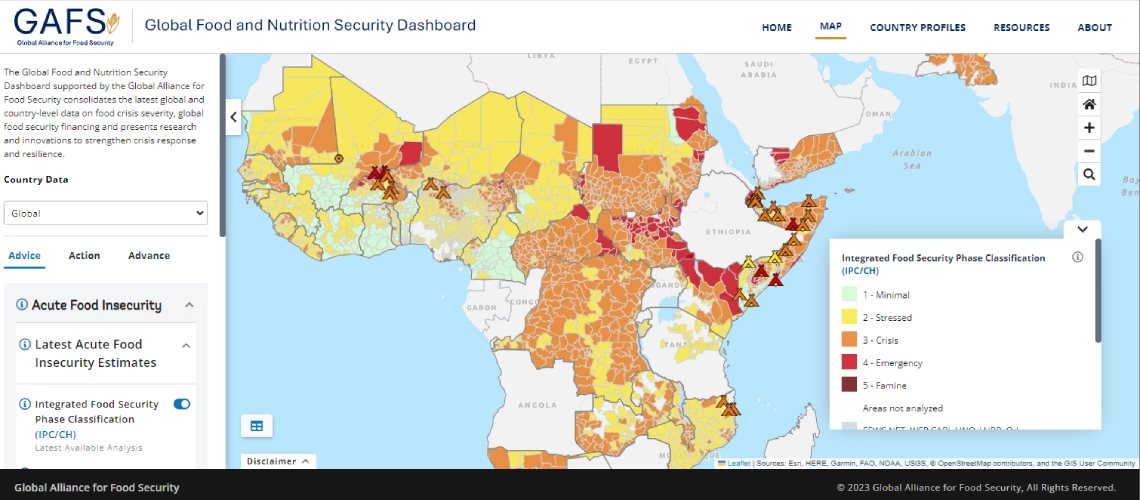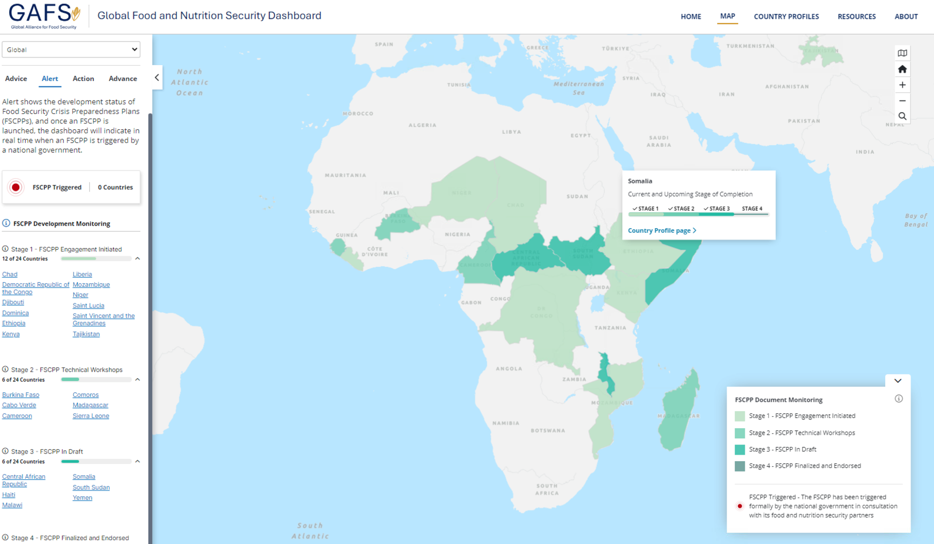 Global Food and Nutrition Security Dashboard
Global Food and Nutrition Security Dashboard
GAFS Global Food and Nutrition Security Dashboard launches live crisis tracker
Tackling severe food insecurity across the globe requires a giant leap in resources, over US$90 to US$120 billion per year according to our latest estimates. The first step in getting there is making greater use of the knowledge and resources we already have. Since its launch, the Global Alliance for Food Security (GAFS) has been strengthening knowledge and much needed investments across humanitarian and development partners to address the current food and nutrition security (FNS) crisis. GAFS was established on May 19, 2022 by the Group of Seven (G7) Development Ministers Meeting to catalyze an agile response to the global crisis exacerbated by the war in Ukraine.
GAFS, convened by the World Bank and the 2022 German G7 Presidency, has active participation from over 60 bilateral and multilateral humanitarian and development partners, United Nations agencies, regional organizations, governments, and civil society organizations. In November 2022, GAFS launched the Global Food and Nutrition Security Dashboard, which is a one-stop-shop for accessing up to date information on the food crisis as well as financing and responses mobilized across national, regional, and international partners.
Ensuring that countries are better prepared to respond to future FNS crises is a top priority for GAFS partners. Unfortunately, these crises are likely to increase in frequency as climate-induced weather extremes, conflict, and other drivers remain protracted. Greater crisis preparedness is imperative to prevent and mitigate emergency and famine conditions as well as to limit the impacts on achieving SDG 2 Zero Hunger.
To build greater preparedness to these crises, GAFS is supporting the development of Food Security Crisis Preparedness Plans (FSCPPs) across 25 countries, many of which are considered to be hunger hotspots. FSCPPs are living national plans that define what constitutes a food crisis in a country and detail protocols, roles, and timelines for mobilizing funding and early action across government, humanitarian, and development partners when these crises strike.
On October 20, 2023, the Global FNS Dashboard launched a new interactive module dedicated to the FSCPPs. This module provides timely and up to date information on the progress made to develop FSCPPs and is a living repository for these plans once endorsed by governments. The Dashboard is also building additional functionality to ‘live track’ actions when FSCPPs are triggered. This, for instance, will enable the timely notification of local, regional, and global partners to raise awareness about the emerging crisis conditions in a country, promote greater advocacy, and encourage the mobilization of additional resources, where possible, across the fullness of the international food and nutrition crisis response system.

New module tracking national Food Security Crisis Preparedness Plans
This added functionality made possible by the Dashboard helps address several longstanding issues which have prevented the mainstreaming of FNS crisis preparedness. By establishing dedicated and standardized processes for recognizing when a major crisis “tipping point” may be occurring, action and financing can be mobilized earlier and more quickly. This knowledge sharing promotes collective action and joint efforts to maximize the impact of responses.
The early impacts of these efforts are already being seen in several countries. For instance, the FSCPP engagement in Yemen has spearheaded a first-of-its-kind collaboration between the Food and Agriculture Organization (FAO), United Nations International Children’s Fund (UNICEF), World Food Programme (WFP), World Bank, and the Assessment Capacities Project (ACAPS) to develop a new high-frequency food and nutrition security report. Additionally, FSCPPs are supporting the establishment and/or revitalization of senior decision-making structures such as food security councils in Somalia and South Sudan. The Dashboard enables such important developments to be easily accessible far and wide and tracked to keep the drumbeat of progress going on this critical agenda.
The Dashboard and FSCPPs represents a new and exciting way of working across humanitarian and development communities to ensure countries and their partners respond faster and more effectively to food and nutrition security crises. Providing near real time knowledge about what is happening when and where allows limited resources to go further and more resources to be accessed. Such efforts are an integral part of strategic and longer-term efforts to build greater ownership and capacity of countries to address their crisis needs proactively and to move one step closer to realizing our goal of achieving zero hunger by 2030.
Related links:
- Global Food and Nutrition Security Dashboard
- Food Security Crises Preparedness Plans
- Global Alliance for Food Security



Join the Conversation